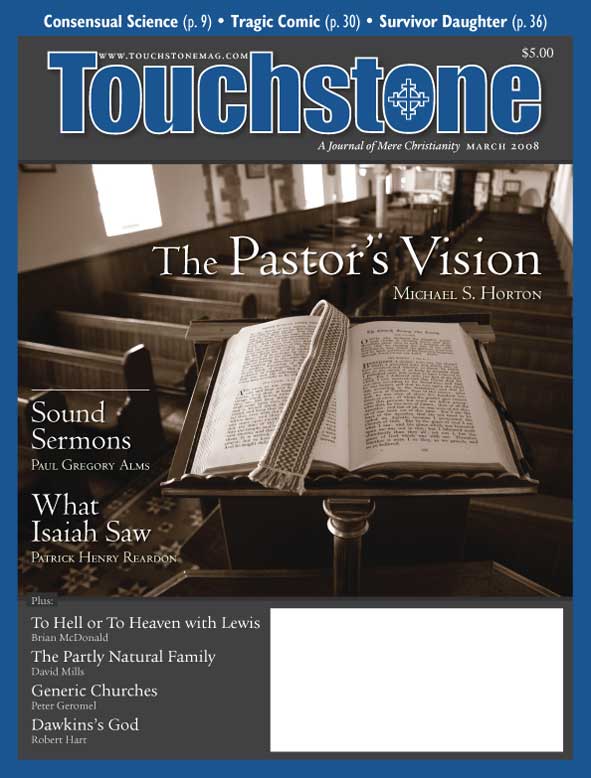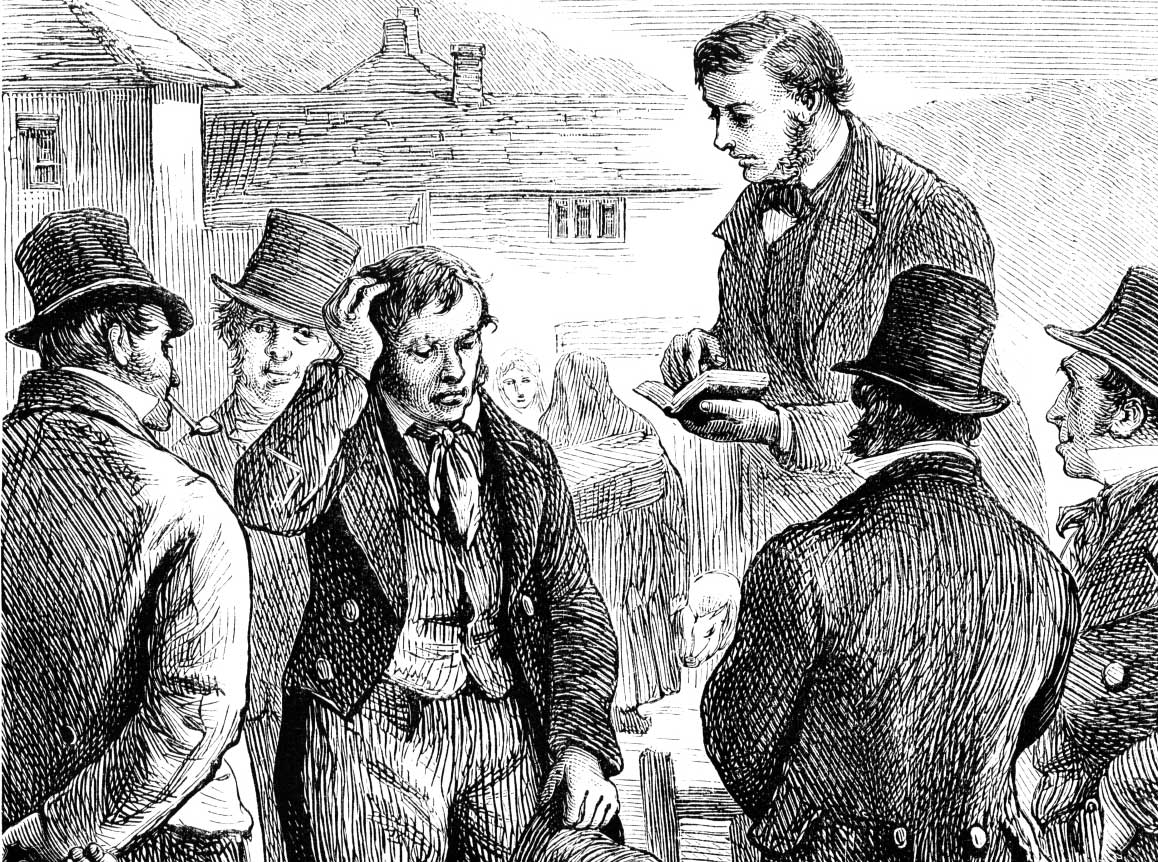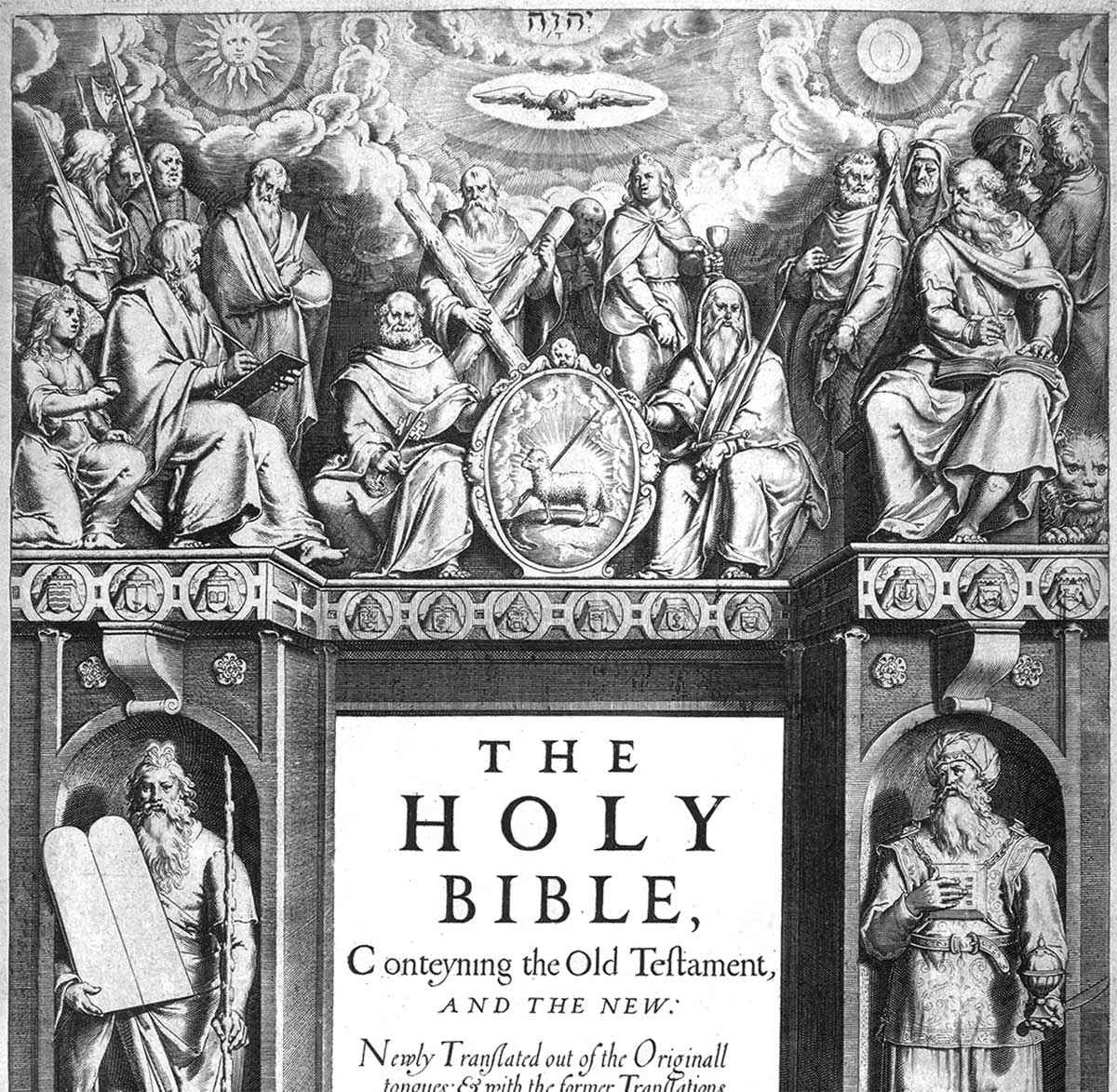Feature
Merely Saved or Merely Damned?
C. S. Lewis Dramatizes the Heart’s Critical Choice
Years ago, my eldest daughter emerged from her room, where she’d been sent for bad behavior, and tearfully handed me a crayon drawing. At the bottom of the page she’d colored in a row of black hearts and crossed out every one. In the middle of the page she had sketched a little stick figure bowing before a crudely drawn cross; from the cross brightly colored yellow arrows pointed upward to a row of red and shiny hearts. As I stared astonished at her startlingly clear iconograph of sin, redemption, and repentance, she threw her arms around me and sobbed, “I want red hearts, not the black hearts.”
Often since that wonderful moment, it has seemed to me that the Spirit of God, who promised Ezekiel, “I will take away the heart of stone and give them a heart of flesh,” had done exactly that in my little daughter, awakening her imagination through bright and powerful imagery that cleared out the fog of childish passion and filled her mind and heart with clarifying light, revealing the stark choice between darkness and light, sinfulness and grace.
I do not know if I have ever experienced a repentance as pure and innocent as my daughter’s, but I have on many occasions known something of that experience in which an awakened imagination illumines the heart and mind—most often while reading or recalling the works of C. S. Lewis. And I am convinced that in an era when the darkness of postmodern confusion lies thickly across the path to the Heavenly City, Lewis’s imaginative and redemptive clarity are more necessary than ever.
This clarity shines particularly brightly in The Screwtape Letters and The Great Divorce, each of which combines Lewis’s two greatest strengths: the apologist’s ability for lucid exposition and the storyteller’s knack for spinning an engaging tale. In these two books, Lewis has cleverly established a premise and a plot whose very nature requires a major character to explain the significance of the events that take place in them. The perils of temptation and the joys of salvation are both dramatized and analyzed, providing the reader with a double vision in which the imagination and the intellect are simultaneously illumined.
Two Kinds of Misdirection
In The Screwtape Letters Lewis creates this stereopsis by presenting the human condition as it appears to one Screwtape, a prominent member of hell’s “lowerarchy.” Through a series of letters to his nephew, a novice tempter named Wormwood, Screwtape shows us the hell’s eye view of how to keep humans from getting to heaven.
The tactics he recommends for Wormwood’s human “patient,” are as complex and varied as their principle is simple: “Aggravate that most useful human characteristic, the horror and neglect of the obvious.” The successful tempter is one who promotes that neglect through continual distraction and misdirection.
This strategy of damnable distraction takes on two opposite forms, which I have labeled “misdirection inward” and “misdirection outward.” Misdirection inward aims at making the patient substitute imagination and feeling for fact and will. Misdirection outward seeks to substitute the opinions of a smart set for the patient’s own understanding while also getting him to evaluate the conventional wisdom of the day on the basis of its appeal and not its truth.
Screwtape lays out the strategy of misdirection inward soon after the patient has undergone the catastrophe (from hell’s viewpoint) of a Christian conversion. To retrieve him, Screwtape proposes that Wormwood divert the man’s attention from outward behavior to inward feelings; this will divert the young Christian’s attention from the way his newfound faith might require a change in his dealings with his mother (with whom he lives):
Keep his mind on the inner life. He thinks his conversion is something inside him and his attention is therefore chiefly turned at present to the states of his own mind. . . . Encourage this. Keep his mind off the most elementary duties by directing it to the most advanced and spiritual ones. . . . You must bring him to a condition in which he can practice self-examination for an hour without discovering any of those facts about himself which are perfectly clear to anyone who has ever lived in the same house with him or worked in the same office.
That hell might actually approve of an active inner life produces a bit of a jolt—succeeded by rueful recognition. For who has not seen how easy it is to make one’s spirituality a refuge from elementary duties, instead of a place to gather strength to face up to them? How much more pleasing is the spiritual excitement of charismatic experience or stimulating Bible study than the painful sobriety of the psalmist’s prayer to “search me and know me and see if there be any wicked way in me”!
If hell’s goal is to keep a patient fixated in navel-gazing subjectivity, it might seem that intercessory prayer, with its necessary focus on others, would guarantee a breakout from the self. But Screwtape emphasizes that even other-directed prayer, properly managed, can immunize the patient against reality. If Wormwood can get him to indulge in high-toned prayers for his mother’s “soul” while ignoring the needs of the real woman, then “in time, you may get the cleavage so wide that no thought or feeling for the imagined mother will ever flow into his treatment of the real one.”
Thus, while Screwtape regards prayer as a disagreeable subject, he also shows that a skilled tempter may turn it into an effective means of getting patients into the house of “our father below.” The trick is to “keep them watching their own minds and trying to produce feelings there by the actions of their own wills.” Such prayer will become an exercise in imagination insulated from fact and ultimately from God himself, “the Fountain of all Facthood,” as Lewis calls him elsewhere.
A will bent on manufacturing feelings may well veer into private revelationism and away from the hard and public revelation of God and his will in the Scriptures and the Church. (Note the phenomenon of modern Christians justifying their divorces on the basis of inner illuminations rather than the Lord’s teaching or the Church’s counsel.)
Dangerous Dry Spells
A full understanding of what Screwtape says about prayer and the inner life might revolutionize what currently passes for spirituality among many Christians in our culture. For Screwtape comes to the counterintuitive conclusion that the peaks of an individual’s spiritual life are potentially less dangerous to hell than the troughs. Thus, at one point he dampens Wormwood’s amateurish ecstasies over his patient’s spiritual dry spell by asking him to consider “why the Enemy does not make more use of His Power to be sensibly present to human souls in any degree he chooses and at any moment.”
The answer? Dry spells are precisely what turn the human creature into one “whose life, on its miniature scale will be qualitatively like His own” through a freely given obedience. A human overwhelmed by the “Irresistible and the Indisputable” is not a free creature, and thus the Enemy withdraws, “at least from their conscious experience, all those supports and incentives. He leaves the creature to stand on its own two legs—to carry out from the will alone duties which have lost all relish.”
Thus, hell does not dread the spiritually rich periods. They are part of the Law of Undulation governing human life. Hell dreads a trained and obedient focus on God even during the dry spells:
Our cause is never more in danger than when a human, no longer desiring, but still intending to do our Enemy’s will, looks around upon a universe from which every trace of Him seems to have vanished and asks why he has been forsaken and still obeys.
With what care Lewis must have placed the word “forsaken” in Screwtape’s mouth! Coming from the Lord’s cry of dereliction on the Cross, we are reminded that his godforsaken obedience was precisely what destroyed the power of hell.
Anything approaching this kind of obedience would break hell’s hold on his followers. Hell cannot touch believers whose motivational foundation has shifted from the whirling and unstable sands of feeling and “experiences” to the solid rock of teeth-gritting faith and an obedient will.
Thus, asceticism, so neglected, even derided today, has always been at the heart of the Christian life, and Screwtape must rejoice that our ancestors’ quaint phrase, “mortification of the flesh,” would sound less archaic than incomprehensible to modern Christian ears.
Misdirection Outward
If misdirection inward neutralizes the patient’s Christian beliefs by keeping the focus on his own mind and moods, misdirection outward aims to destroy his belief by getting him to respond only to the mind and moods of others.
These others can be specific persons, such as clever, progressive friends whose good opinion must be purchased by abandoning or hiding one’s beliefs. Or they can be amorphous things, such as the spirit of the age, whose pet ideas and favorite buzzwords make one feel callow and naive in his old-fashioned Christianity. Screwtape encourages Wormwood to work on both.
Misdirection outward is probably most effective when it comes in the form of clever and appealing people who are likely to disdain all that a Christian believer holds dear. Thus, we find Screwtape congratulating Wormwood on bringing a new and up-to-date couple into the patient’s life: “Rich, smart, superficially intellectual, and brightly skeptical about everything in the world,” this couple obviously represents the in-crowd’s seductive and Circe-like power to turn the ordinary man into a witless dog begging for approval.
The power of the “Inner Ring” is one of Lewis’s major themes, and he describes it thus in his essay of the same title: “It would be so terrible to see the other man’s face—that genial, confidential, delightfully sophisticated face—turn suddenly cold and contemptuous. . . .” The fear of such a moment leads the patient to postpone recognizing the conflict between his new acquaintances and his faith; in this postponement lies the possibility of prying him loose from that faith:
As long as the postponement lasts, he will be in a false position. He will be silent when he ought to speak and laugh when he ought to be silent. He will assume . . . all sorts of cynical and skeptical attitudes which are not really his. But if you play him well, they may become his. All mortals tend to turn into the thing they are pretending to be.
The Inner Ring having cast its spell, the spirit of the age may now complete the job of turning the patient into what he is initially only pretending to be. Wormwood must play on his patient’s desire to be up to date with current notions and not let his attention wander to the rather different issue of whether the current notions are true: “Now, if we can keep men asking: ‘Is it in accordance with the general movement of our time? Is it progressive or reactionary? Is this the way that History is going?’ they will neglect the relevant questions.”
By mixing together such terms as “historical point of view,” “phase,” and “that blessed word Adolescent,” Wormwood can pump a continuous fog of “hazy ideas of progress and development” into the patient’s head and produce in him a chronic (though unexamined) feeling that Christian belief is just a phase to be left behind. Fearful of turning into an intellectual adolescent, the patient may never consider that the question of truth is still to be settled: a good thing from Screwtape’s view, since a careful consideration of the reasonable and the true will always tell in the Enemy’s favor.
The Devil’s Goal
In our day, postmodernism is an even more effective fog machine than the Historical Point of View Screwtape touted, because it calls the very notion of truth into question. The Christian faith is now simply the “narrative” one community tells to provide meaning for its members; it’s no more true or false than any other community’s meaning-bestowing narrative. Screwtape had to worry that his patient might start thinking about whether a view was true or false. His successors have taken the question of truth off the table altogether.
But while intellectual fashions may change, the diabolical goal is the same: “that nonsense in the intellect may reinforce corruption in the will.” Progressivism’s view that all change is good and the postmodern notion that opposing viewpoints are equally valid are both self-evidently nonsense. The embrace of such nonsense by well-educated people is both a cause and result of the will’s corruption, which is Screwtape’s goal.
Thus, behind the unreasonable lies the diabolical. The very narrative shape of The Screwtape Letters—a devil coolly analyzing how best to deflect human attention away from reason, the factual, and the obvious—drives this home as no mere exposition could. As we read, we simultaneously recognize the psychology of temptation and experience it as a diabolical strategy. The universal nature of so many of the temptations and the very anonymity of the patient add to the effectiveness of Lewis’s narrative.
It is almost impossible to follow the story of this unknown person through Screwtape’s eyes without developing an eerie feeling that he’s writing letters about us. His advice to Wormwood leaves us with a salutary though uneasy question: How am I aiding and abetting the infernal powers that seek to move me towards my own damnation?
This Screwtape device encourages a durable awareness that certain inclinations are in fact temptations that we would prefer to disguise as “spirituality,” “maturity,” “liberation,” or some other shibboleth. Faced with self-induced or genuine confusion regarding any of our own inclinations, we have but to ask, “What would Screwtape wish me to do?” and put his answer in reverse to get ourselves on the right track.
Resisting Joy
If The Screwtape Letters aids our war against temptation by providing a hell’s-eye view of heaven, The Great Divorce does so by presenting a heaven’s-eye view of hell. Like The Screwtape Letters, it combines story and commentary as Lewis, both the narrator and a character in the story, finds himself a passenger on a mysterious bus transporting lost souls from the suburbs of hell to the outskirts of heaven.
In the celestial environment, the visitors are mere wraiths picking their way across a heavenly landscape so painfully solid that the very blades of grass pierce their feet (Lewis’s symbolic way of contrasting the reality of life in God with the nothingness of hell). A number of “solid” people—friends or family from the ghosts’ earthly lives—appear and attempt to persuade these sad and shabby shades to exchange the self-preoccupations of hell for the outward-looking joys of heaven, but, with one or two exceptions, they fail.
The spirit of George MacDonald, the Scottish author whose writings Lewis credits with having baptized his imagination long before he became a Christian, appears and explains this mysterious refusal of Joy:
“ Milton was right,” said my Teacher. “The choice of every lost soul can be expressed in the words ‘Better to reign in Hell than serve in Heaven.’ There is always something they insist on keeping, even at the price of misery. There is always something they prefer to joy—that is to reality. Ye see it easily enough in the spoiled child that would sooner miss its supper than say it was sorry and be friends.”
This reality of sin as a form of the sulks permeates the series of memorable vignettes that unfold before the reader. One by one, we are introduced to characters so consumed by having it their own way that almost nothing remains inside them that could desire heaven: the apostate bishop humming hymns as he smilingly rejects the dogmatic finality of heaven; the complaining woman who is actually turning into a grumble; the man who cannot bear to break the back of the obscenity-spouting lizard that grips his shoulder; the dwarf who directs a giant actor to mouth histrionic self-pity every time his redeemed wife tries to tell him the truth about their earthly marriage .
The reader’s mental gallery is now equipped with permanent portraits of the sin each character represents: rejecting faith to follow the spirit of the age; nursing and exaggerating one’s grievances; yielding to lust; indulging in phony self-dramatization to manipulate others.
Powerful Visitations
The most powerful of these portraits for me is that of the dwarfish man who has a kind of ventriloquist/dummy relation to a giant, seedy, actor-like figure who speaks lines for him every time he jerks a chain connecting them. His wife—a mere housewife on earth, but one of the Great Ones in heaven—has journeyed from its highest regions to lure her husband into joy.
But the terms of heaven require the dwarf to accept and rejoice that in heaven his wife has gone far beyond needing him, and he must also surrender all attempts to manipulate her pity by continuing the marital melodrama in which he played the misunderstood and neglected husband on earth. In the ensuing struggle between the real man and the phony actor, the actor prevails, swallowing up both chain and steadily shrinking dwarf—signaling the latter’s preference for posturing over his own actual existence.
Such images as these are so vivid and unforgettable that they may readily come to a reader’s mind in counterpart situations in real life. For example, any reader in the midst of declaiming a “have-you-no-regard-for-me” speech to his spouse may suddenly and unexpectedly find himself staring straight into the faces of the dwarf and his actor.
It is a salutary and healing experience to realize that I am a shrinking dwarf. At this moment, I am dwindling into a shabby melodramatist strutting and fretting my way across my domestic stage. I am preferring the strange pleasures of being angry and wrong to the joyful intimacies of confession and reconciliation.
Once this book has gotten into a reader’s bloodstream, none of the false pleasures of clinging to sin is safe from the power of an interrupting visitation from one of Lewis’s characters. With bright, heraldic clarity they show us exactly what we are doing. Particularly apropos for an era in which lust is exalted and addictions abound is the remarkable vignette in which a man tormented by lust in the form of a lizard perched on his shoulder struggles against an angel’s offer to destroy it. As is the case with addictions, the man’s misery also serves as the very meaning of his life, and the lizard plays on his fears that he would be maimed if he gave it up:
“ Be careful,” it said. “He can do what he says. He can kill me. One fatal word from you and he will. Then you’ll be without me for ever and ever. It’s not natural. How could you live? You’d only be a sort of a ghost and not a real man as you are now.”
Nevertheless, in a frenzied burst of resentful and agonized surrender, the man gives the angel permission to destroy the lizard.
The broken-backed creature is flung to the ground. But instead of dying, it begins to grow:
And as it grew it changed. Its hinder parts grew rounder. The tail, still flickering, became a tail of hair that flickered between huge and glossy buttocks. . . . What stood before me was the greatest stallion I have ever seen, silvery white but with mane and tail of gold.
The man, also transfigured, leaps on the stallion and begins galloping bareback towards the high mountains of heaven.
Passions Transfigured
The iconic power of such images can affect the reader unconsciously, but the reflections of George MacDonald add greatly to their effectiveness. He is no more didactically intrusive in The Great Divorce than is Virgil in Dante’s Divine Comedy. In fact, like Virgil, he ensures that our understanding will reap the full benefit of what our imaginations have experienced.
MacDonald’s teaching on the meaning of the lizard scene, for instance, ensures that we rightly understand the meaning of this redemptive pageant. First, he teaches that sinful passions are to be transfigured, not destroyed: “What is a lizard compared to a stallion? Lust is a poor, weak, whimpering thing compared with that richness and energy of desire which will arise when lust has been killed.”
But more importantly, he draws our attention to something that we might not even begin to consider: Not only must the overtly sinful passions of life be transfigured, but all of the passions, even the “highest”:
“ Nothing, not even the best and noblest, can go on as it now is. Nothing, not even what is lowest and most bestial, will not be raised again if it submits to death. . . . Flesh and blood cannot come to the Mountains. Not because they are too rank, but because they are too weak.”
In other scenes, MacDonald makes this clear by showing that many who return to hell’s bus do so because they cannot let go of their “best” quality—
mother-love in one case, insistence on fair play and one’s rights in another, the exaltation of artistic creativity in yet another—and surrender it into God’s hands for remaking.
The power of The Screwtape Letters and The Great Divorce lies in the intertwined links of explanation and imagery that Lewis forges to connect the vast issues of beatitude or damnation with the seemingly tiny doings of the everyday and the obvious. Lewis has been much criticized for this “moral pettiness,” but it may be his greatest strength. For it is in the ebb and flow of the ordinary that our lives are lived, our characters made, and our destinies forged. Thus Screwtape labors mightily to cultivate a “horror of the obvious,” while The Great Divorce uses extraordinary imagery to make the ordinary visible.
This emphatic linkage of heaven and hell with ordinary choices and experiences draws attention to another important quality of these two books. Neither lets us forget that Christianity is all about salvation or damnation. While Christians, even in our frivolous age, are obliged to pay lip service to this fact, we may well wonder if it has not lost its hold on both our imagination and our understanding.
The best cure for what Lewis called our “fatal insensibility to sin” can only be a revivified longing for heaven and awareness of hell, the destinies that every soul must decide between. A rekindled recognition of sin’s infernal destination in the next life would immensely clarify our awareness of its corrupting effects in this.
A reawakened sense of the “joy set before us” might inspire us to take up with renewed hearts the cross of overcoming sin—lest we live out our days with black hearts of stone.
subscription options
Order
Print/Online Subscription

Get six issues (one year) of Touchstone PLUS full online access including pdf downloads for only $39.95. That's only $3.34 per month!
Order
Online Only
Subscription

Get a one-year full-access subscription to the Touchstone online archives for only $19.95. That's only $1.66 per month!
bulk subscriptions
Order Touchstone subscriptions in bulk and save $10 per sub! Each subscription includes 6 issues of Touchstone plus full online access to touchstonemag.com—including archives, videos, and pdf downloads of recent issues for only $29.95 each! Great for churches or study groups.
Transactions will be processed on a secure server.
more on C. S. Lewis from the online archives
more from the online archives

24.6—Nov/Dec 2011
Liberty, Conscience & Autonomy
How the Culture War of the Roaring Twenties Set the Stage for Today’s Catholic & Evangelical Alliance by Barry Hankins
calling all readers
Please Donate
"There are magazines worth reading but few worth saving . . . Touchstone is just such a magazine."
—Alice von Hildebrand
"Here we do not concede one square millimeter of territory to falsehood, folly, contemporary sentimentality, or fashion. We speak the truth, and let God be our judge. . . . Touchstone is the one committedly Christian conservative journal."
—Anthony Esolen, Touchstone senior editor











